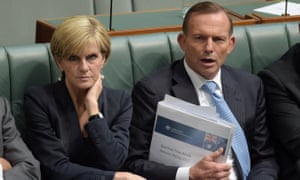Statements by Tony Abbott suggesting that climate change is “probably doing good” are
different to his opinion while he was prime minister and it is up to
him to explain why he has changed his view, Julie Bishop has said.
Speaking from South Korea on the ABC’s 7:30 on Thursday, the foreign affairs minister rebuked Abbott by recounting his record of signing the Paris climate agreement and setting the renewable energy target.
Bishop’s comments follow a similar intervention from energy and environment minister, Josh Frydenberg, stating that climate change is real and recalling that Abbott signed the Paris agreement.
On Monday evening Abbott told a climate sceptic thinktank in London that policies to combat climate change were like “primitive people ... killing goats to appease the volcano gods”. He also reprised his 2009 assertion that the “so-called settled science of climate change” was “absolute crap”.
Asked about Abbott’s comments, Bishop said he was “entitled to express his views, as any other member of parliament ... is entitled to do”.
But she added: “The views he expressed recently are different to
those he expressed as prime minister when he supported the Paris
agreement, and in fact set a nationally determined targets and the
renewable energy target was established under then Prime Minister
Abbott,” she said. “So, it’s up to him to explain the differences
between his opinion then and his opinion now.”
Bishop said the Turnbull government was determined to deliver “affordable, reliable energy ... that will still meet our international obligations, which were, in fact, established under then Prime Minister Abbott”.
Asked why Abbott was not expelled for “constant breaches of discipline”, Bishop noted that he was discussing an issue that was “controversial” in some sectors of the community.
Bishop suggested the reason there was “a deal of interest in what he has to say” is that he had changed his mind from his view as prime minister. “I think the question that has to be asked of Tony Abbott is why does he have a different view now than when he was prime minister?”
With the government backing off the clean energy target recommended by the chief scientist, it is unclear what mixture of climate policies it will propose to meet international obligations.
Bishop said the Turnbull government’s energy policy “will be discussed by cabinet and by the party room and then of course announced to the Australian public”.
The government could unveil its energy policy as soon as next week, when parliament resumes for the final spring session.
The expected overhaul of the market rules in the government’s looming energy policy overhaul is expected to be accompanied by mechanisms to reduce greenhouse gas emissions, including the use of international permits, which the government first signalled when it launched a review of its Direct Action policy.
The energy sector also expects the existing Emissions Reduction Fund, which is the Coalition’s voluntary scheme that gives incentives for farmers and landholders to reduce emissions, will also have its funding topped up between now and the next election.
Abbott’s speech was labelled “loopy” by Labor’s deputy leader, Tanya Plibersek, but defended in part by Liberal MP Craig Kelly, the chairman of the backbench committee on climate and energy.
Speaking from South Korea on the ABC’s 7:30 on Thursday, the foreign affairs minister rebuked Abbott by recounting his record of signing the Paris climate agreement and setting the renewable energy target.
Bishop’s comments follow a similar intervention from energy and environment minister, Josh Frydenberg, stating that climate change is real and recalling that Abbott signed the Paris agreement.
On Monday evening Abbott told a climate sceptic thinktank in London that policies to combat climate change were like “primitive people ... killing goats to appease the volcano gods”. He also reprised his 2009 assertion that the “so-called settled science of climate change” was “absolute crap”.
Asked about Abbott’s comments, Bishop said he was “entitled to express his views, as any other member of parliament ... is entitled to do”.
Bishop said the Turnbull government was determined to deliver “affordable, reliable energy ... that will still meet our international obligations, which were, in fact, established under then Prime Minister Abbott”.
Asked why Abbott was not expelled for “constant breaches of discipline”, Bishop noted that he was discussing an issue that was “controversial” in some sectors of the community.
Bishop suggested the reason there was “a deal of interest in what he has to say” is that he had changed his mind from his view as prime minister. “I think the question that has to be asked of Tony Abbott is why does he have a different view now than when he was prime minister?”
With the government backing off the clean energy target recommended by the chief scientist, it is unclear what mixture of climate policies it will propose to meet international obligations.
Bishop said the Turnbull government’s energy policy “will be discussed by cabinet and by the party room and then of course announced to the Australian public”.
The government could unveil its energy policy as soon as next week, when parliament resumes for the final spring session.
The expected overhaul of the market rules in the government’s looming energy policy overhaul is expected to be accompanied by mechanisms to reduce greenhouse gas emissions, including the use of international permits, which the government first signalled when it launched a review of its Direct Action policy.
The energy sector also expects the existing Emissions Reduction Fund, which is the Coalition’s voluntary scheme that gives incentives for farmers and landholders to reduce emissions, will also have its funding topped up between now and the next election.
Abbott’s speech was labelled “loopy” by Labor’s deputy leader, Tanya Plibersek, but defended in part by Liberal MP Craig Kelly, the chairman of the backbench committee on climate and energy.

No comments:
Post a Comment